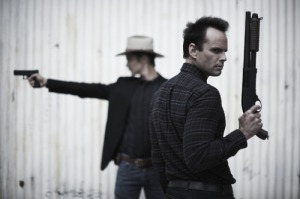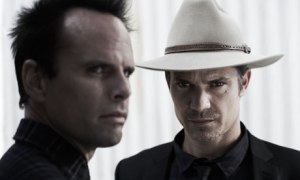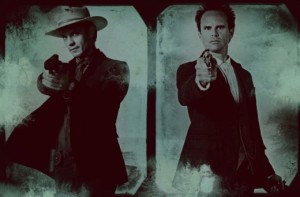“They had dug coal together as young men and then lost touch over the years. Now it looked like they’d be meeting again, this time as lawman and felon, Raylan Givens and Boyd Crowder.”
That’s the first paragraph of Elmore Leonard’s “Fire in the Hole” and the premise of FX’s Justified, which has entered its sixth and final season. The New York Times calls the show a “crime drama,” but the cowboy hat on Timothy Olyphant’s head says Western to me—that and the fact the actor had recently finished playing sheriff on HBO’s Deadwood when he took up the role.
Olyphant’s U.S. Marshall is named Raylan, but he borrows his DNA from another Leonard short story, “How Carlos Webster Changed His Name to Carl and Became a Famous Oklahoma Lawman.” Michael Chabon included it in the Thrilling Tales issue of McSweeney’s he edited in 2003, infusing a much needed dose of pulp into the quite realms of literary fiction. I assigned Leonard’s and a half dozen other Thrilling Tales to my advanced creative writing class this semester. The Justified writing team must have a copy too. Olyphant voiced Carl’s dialogue on the pilot: “I want to be clear about this so you understand. If I pull my weapon I’ll shoot to kill. In other words, the only time Carl Webster draws his gun it’s to shoot somebody dead.”
Which Rayland Givens does too. Many many times in the past five years. It’s his character’s most charming superpower, that good-natured indifference to moral quandaries. Raylan never hesitates before shooting and he never second guesses himself afterwards. The cocky smile never changes either. As Marshall Webster’s father says: “My Lord, but this boy has a hard bark on him.”
That’s standard gunslinger M.O., a cold-blooded willingness to step over the line and do whatever needs doing to keep the good folks of his community safe and sound. Or, as Richard Slotkin in Gunfighter Nation says of frontiersmen:
“Through this transgression of the borders, through combat with the dark elements on the other side, the heroes reveal the meaning of the frontier line (that is, the distinctions of value it symbolizes) even as they break it down. In the process they evoke the elements in themselves (or in their society) that correspond to the ‘dark’; and by destroying the dark elements and colonizing the border, they purge darkness from themselves and the world.”
So Raylan’s job is darkness-purger for the crime-swamped frontier of modern Kentucky. And he was doing a pretty good job in season one, and even better season two (one of my all-time favorite 14-episode arcs of any TV show). But then things started to shift. Not his smile, not his pistol grip, those are unflinching as ever—which, oddly, creates a kind of change in his character: the inability to change.
When E. M. Forster read Moby Dick, he saw “a battle against evil conducted too long or in the wrong way.” Captain Ahab—a once-valiant knight sailing in the service of good—devolves into the evil he thought he was fighting. That’s Raylan’s problem too. A hero can only spend so long in that darkness before he sinks in too far. Instead of purging the darkness, Raylan is wallowing in it.
His first two season, he at least theoretically was trying to complete his Ahab mission and retire into the domestic bliss of marriage and fatherhood. But then he watched his true love stroll off camera while he battled the next round of Kentucky gangsters. He picked up some more girlfriends, but his unflappable indifference applied to them too. After three more seasons of random acts of love and violence, Raylan’s emotional range never inched off the glib meter. Instead of a man with a well-armored moral center, all that manly bark looks like a facade papered over an abyss.

Boyd Crowder, however, has aged much better. Sure, actor Walton Goggins’ receding hairline is undermining the character’s crazy hair look, but otherwise Boyd is as paradoxically loveable as ever. I would call him an anti-hero, but he’s more a heroic villain, a guy of deep but unpredictable passions in struggle with his inner darkness. Unlike Raylan, he doesn’t know himself, and so each season has been a chaotic and inevitably corpse-ridden quest for self-discovery.
Frank Miller, the villain that provides Marshall Webster his origin story and plot closure, is as two-dimensional as his Batman-writing namesake (comics artist Howard Chaykin, even more coincidentally, illustrates the tale). The Boyd Crowder of “Fire in the Hole” is just an oddball Nazi thug there to give his Marshall Givens a character-revealing moral dilemma: can you put down a man you once dug coal beside? The answer is, of course, yes, and so the story has its ending. Justified, however, has been stringing out that last paragraph for five years, only now in the final season promising to complete the stand-off.
Both characters are caricatures of American masculinity, sharing the absurd ur-trait of psychopathic violence, but they spin that violence in opposite directions. Boyd’s search for meaning is almost proof enough that such meaning is possible. A universe of destructive hope pumps just under his skin. Raylan is nihilism personified. Peel back the bark, and the black hole of his heart would suck the world dry.
These aren’t the characters Elmore Leonard created. I’m not sure the writers of Justified created them either. This is just what happens when you drop short story characters into an open-ended serial form, extending their timelines far beyond the closure points they were designed to inhabit. As Forster says of Ahab, they get “warped by constant pursuit.”


Chris, you nailed this one. Justified was once my favorite currently running series. My wife said it was just because it reminded me of home — and I’ll admit, the forested mountains tug nostalgically at my heart — but it’s more than that. We, the viewers, used to be able to count on our hero Raylan to do the right thing, even if it wasn’t the lawful thing. He used to have functional relationships with his peers. He used to treat even the criminals — heck, especially the criminals — as human beings, worthy of some dignity, with their own feelings and goals and even value. That was not only his most admirable trait, it was his most professionally useful one after his marksmanship. It was the one thing that kept him from having to draw his weapon even more often than he did. He used to call for help and (okay, grudgingly) support the team, because even as good as he was, he knew he wasn’t superhuman, and he often made mistakes. He even used to be funny.
Now, as you point out, he’s just as glib as ever, but he’s never funny anymore. People usually aren’t even funny in his presence. He doesn’t reliably treat colleagues and loved ones the way they should be treated, much less his prey. Consequently, he’s not as good at his job anymore. And watching the show has been like hanging out with a friend on a self-destructive spiral. You feel a duty to be there with him, and you keep looking for a glimmer of hope he’ll pull out of it, but it isn’t much fun waiting for the moment of clarity to hit.
“Warped by constant pursuit” is spot-on, and while there are obvious political parallels to be drawn, others will enjoy drawing them far more than I would, so I leave them to it.
Thank God for Boyd Crowder. He is the walking examplar of Mazlow’s hierarchy of human needs. However, just as Mazlow’s successors argued was true about humans in general, Boyd does not follow the hierarchy. He is all over the pyramid at once, pursuing survival and love and self-actualization and prosperity and spiritual connection and meaning all at once or in rapid succession, and in no particular order. Unlike Raylan, who has done so much to survive but no longer seems to know why, Boyd Crowder is madly and desperately alive. We root for him to survive and find love and find a moral compass he feels like he can trust, all the while knowing Raylan or another officer of the law might kill him or lock him up for good and be perfectly justified in doing so.
I have not been able to see a single episode this season and will probably watch the whole thing after it’s over. I hope it’s good again. I hope they both find what Boyd’s stil actively looking for.
I’ve watched the first two episodes, and though they’re no match for season 2, the knowledge that final closure is only weeks away alters the feel of things. Nothing brilliant so far, but, like Boyd, I’m hopeful.
Well, “Your strength gives me strength.” (Benny in The Mummy, right before he turned and ran). Seriously, I am encouraged by your hope and looking forward to seeing this final season.
One more thought: I think Raylan’s ability to see his opponents as people (a blessing of his difficult upbringing) is, paradoxically, part of why he’s so comfortable killing them. In Raylan’s philosophy, his adversaries made decisions while fully aware of the potential consequences. Part of respecting their agency as human beings is allowing those consequences to occur. And when he shot adversaries, depending on the circumstances, he saw himself as simply a natural consequence of poor decision-making, no more guilty than the brick wall the drunk driver eventually hits.
Oh, and Mazlow = Maslow, of course. I considered a campaign to change the spelling in every social science textbook in America, but admitting my error seems less laborious.